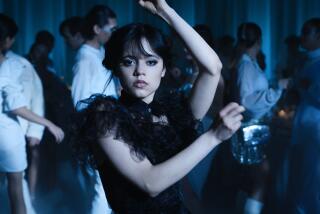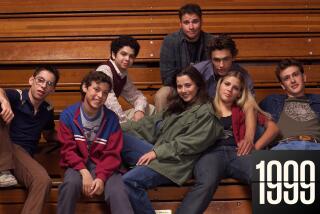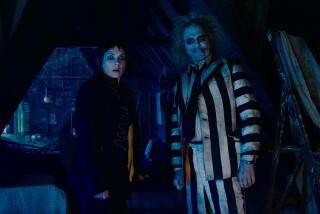Review: Earth tones, rotary phones and Winona Ryder: Netflix’s ‘Stranger Things’ is totally ‘80s
Like the SiriusXM station dedicated to hits of the 1980s, Netflix’s new sci-fi/horror/kid-hero series “Stranger Things” is a celebration of nostalgia.
“Dungeons & Dragons,” earth tones, rotary phones, wood paneling, banana seats, “Aliens,” “Star Wars,” pudding cups, Stephen King, John Carpenter, rugby shirts, all manner of terrible haircuts, John Hughes, the Evil Empire, “War Games” and, above all, the oeuvre of Steven Spielberg — “Stranger Things” creators Ross and Matt Duffer reference and re-reference the cultural touchstones of an American childhood they are too young to have shared with loving, amber-hued abandon.
“Stranger Things” doesn’t just star 1980s icon Winona Ryder, it stars 1980s icon Winona Ryder in a brown corduroy coat.
See the most-read stories in Entertainment this hour »
Not surprisingly, the eight-episode series staggers occasionally under the weight of all this hoarded homage, loses its narrative thread while chasing down some other bit of cinematic memorabilia. But for the most part, and in absolute defiance of the odds, “Stranger Things” honors its source material in the best way possible: By telling a sweet ’n’ scary story in which monsters are real but so are the transformative powers of love and fealty.
The trappings may have been pried from the frozen ice of the Reagan administration, but the themes and the characters are timeless.
In a small Indiana town, 12-year-old Will (Noah Schnapp) goes missing. As far as his friends know, he rode his bike home after a 10-hour session of “Dungeons & Dragons” at Mike’s (Finn Wolfhard), like you do when you’re a member of a small-town nerd squad.
The audience, however, knows differently. The audience knows that Something Terrible has happened, something that involves surging electricity, weird sound effects and whatever chased a terrified scientist down a desolate and clearly secret hallway during the show’s opening sequence.
So when Will’s mother, Joyce (Ryder), begins immediately and hysterically demanding that the scruffy, boozy and clearly damaged Chief Hopper (David Harbour) find her son, we are right there with her.
But Hopper has many other things on his mind, including a shocking local death and reports of a mysterious runaway. So it falls to Will’s friends — Mike, Lucas (Caleb McLaughlin) and Dustin (Gaten Matarazzo) to begin tracking him down.
A trio of geek brio, they are knowledgeable acolytes of both technology and epic fantasy, which means they are used to living in their own world.
So when they encounter the above-mentioned runaway, a saucer-eyed and initially mute girl played with astonishing power by Millie Brown, it seems only natural that they would hide her, “E.T.”-like, in Mike’s basement.
Eleven, named for the number tattooed on her wrist, is obviously terrified. On the run from “bad men,” headed by a stone-faced Matthew Modine in a sinister blue suit and ignorant of basic human relationships, El (as the boys call her) is more alien than “E.T.” ever was, but she reluctantly aids the search for Will.
Aboveground, Mike’s sister Nancy (Natalia Dyer) is following a more “Pretty in Pink” storyline until it goes John Carpenter, which eventually teams her up with Will’s brother, Jonathan (Charlie Heaton). Jonathan has a reputation among the town’s conformist teens for being “crazy,” possibly because he listens to the Clash, possibly because he has been raised by a single mother.
Joyce, meanwhile, is conducting her own search, which, with its many quite dazzling references to “Poltergeist” and “Aliens,” leads everyone to think she’s nuts.
In other words, there’s a lot going on in terms of story and pop culture footnoting and not all of it works. Joyce is rarely allowed a moment in which she is not hysterical, though Ryder mostly manages to sustain a defiant edginess that saves Joyce from the “one-note” category. A side story about Nancy and her love life seems a drawn-out and increasingly unnecessary attempt to give the older daughter from “Poltergeist” a John Hughes story line.
More tragically, Modine’s talents are wasted: His evil-doer is a psycho automaton whose intentions are never made clear.
But when it does work, which is most of the time, “Stranger Things” is genuinely creepy and sincerely sweet, two great tastes that may, in the parlance of the times, taste great together but are difficult to blend successfully. As the many filmmakers hoping to become the next Spielberg have learned over the years.
‘Stranger Things’ doesn’t just star 1980s icon Winona Ryder, it stars 1980s icon Winona Ryder in a brown corduroy coat.
Ryder is great, Harbour grows on you, but “Stranger Things” belongs to the kids, especially the five young ones. Brown is the most obvious marvel. With their pastiche of genres, the Duffer brothers manage to skirt the hideous abuse El has endured (though the tattoo, shaved head and initial starvation dangerously evoke real horror), but El is taut with the tension between real power and inflicted powerlessness. If certain scenes dwell too long on her silence or enormous eyes, that is not Brown’s fault. With few words, she manages to evoke a cacophony of emotion, from terror to tender young love.
And the three boys are just as strong, each charmingly on target: Mike is the ringleader, Luke is the voice of reason/doubt, Dustin the clown and problem-solver. Monsters of all sorts beware. Together, they are unstoppable.
Someone should give them their own series.
‘Stranger Things’
Where: Netflix
When: Any time starting Friday
Rating: TV-14 (may be unsuitable for children under the age of 14)
On Twitter: @marymacTV
ALSO
Emmy nominations reflect the moment we are in — political, divided and distrustful
On TV, rage has become the new romance
In the age of ‘Peak TV,’ how Emmys overtook ratings as the standard for success
More to Read
The complete guide to home viewing
Get Screen Gab for everything about the TV shows and streaming movies everyone’s talking about.
You may occasionally receive promotional content from the Los Angeles Times.







